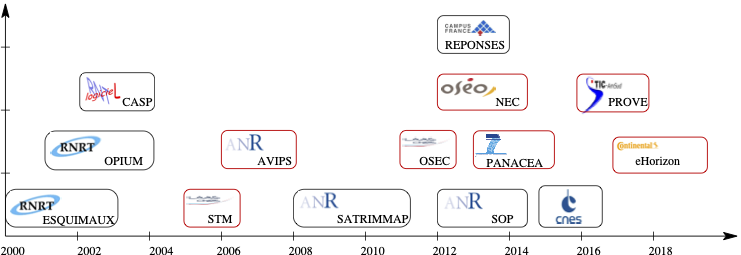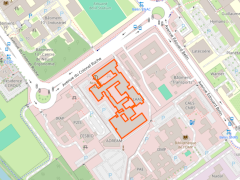Olivier Brun
With communication networks getting more and more present in our daily activities, network outages or even significant degradations of the quality of service become less and less tolerable. Network survivability and the control of the quality of service are thus critical issues that require significant methodological progresses in various scientific fields. Our contributions fall in two broad categories : performance evaluation and optimization of networks.
Our research works on the performance evaluation of networks are based on queueing and game theories. They aim at the development of analytical or simulation-based methods for the large-scale evaluation of the main performance metrics, both at the packet level (delay, loss rate and jitter) and at the flow level (number of active sessions, download times, etc). They also deal with the worst-case analysis of the performance of decentralized routing algorithms.
The second category of contributions are mainly devoted to the development of new optimization methods for the design of survivable access and backbone networks, for capacity-planning and for route optimization. Since most of these problems are NP-hard combinatorial problems, often with non-linear cost functions, we usually have to devise specifically tailored approximation algorithms. Another work in the applied optimization field deals with the strictly periodic scheduling of tasks in embedded avionic systems.
Projects
I have been involved in 14 research projects, as shown in the figure below.

I was the scientific coordinator of two international projects, as detailed below:
- FP7 PANACEA: PANACEA was a european project aiming at proposing innovative solutions for a proactive autonomic management of cloud resources, based on a set of advanced machine learning techniques and virtualization. The goal was to develop the mechanisms enabling the design of slef-configuring, self-healing and self-optimizing cloud services. Please, refer to the PANACEA web site for more details.
- STIC AmSud PROVE: PROVE was a research project gathering participants from Chile, France and Uruguay. Its goal was to build a routing overlay that can be widely deployed over a sizable population of routers. We have designed both active measurement methods providing an accurate estimation of the quality of overlay links without overloading the network, and online learning algorithms for discovering optimal routes with a scalable probing overhead. Please, refer to the PROVE web site for more details.
Collaborations
Past and on-going collaborations:
- LAAS-CNRS: Balakrishna Prabhu, Pascal Berthou, Slim Abdellatif, Hassan Hassan, Samir Medjiah
- University of the Basque Country: Josu Doncel
- Imperial College London: Lan Wang, Erol Gelenbe, Yonghua Yin, Yasin Murat Kadioglu and Basil Elmasri
- IRIT : Urtzi Ayesta,
- Laboratoire d'Informatique d'Avignon: Rachid El Azouzi, Francesco de Pellegrini
- Télécom Bretagne: Sandrine Vaton and Isabel Amigo,
- Universidad de Conception (Chile): Christopher Thraves Caro,
- UdelaR (Uruguay): Pablo Javier Belzarena,
- IBM Haifa: Eliezer Dekel and Vita Bortnikov,
- IRIANC: Dimiter Avresky,
- Universidad Complutense de Madrid: Eduardo Huedo and Daniel Molina,
- ATOS Spain: David Garcia Perez and Ivan Febles,
Software
My research activities sometimes give rise to the development of software solutions. I present below two of the main realizations.
- SMART: SMART is an overlay routing software designed to enhance availability and performance of Internet routes for distributed applications. SMART has been released as an open-source software.
- NEST: funded by me and two other colleagues, QoS Design is an independent French software company. QoS Design develops and sells a consistent software suite for network modelling, simulation, planning and supervision. This software suite, called NEST (Network Engineering and Simulation Tool), provides both unique simulation techniques and powerful network optimization algorithms in a proactive and reactive workbench. NEST integrates some of the models and algorithms I have designed for network optimization (network design, capacity planning, route optimization) and performance evaluation.













